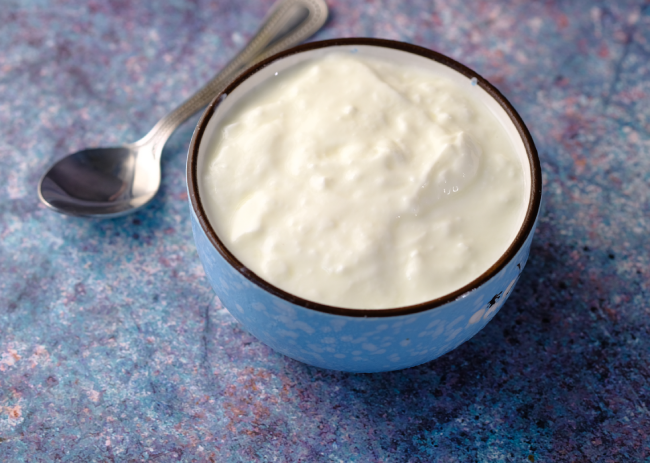Yogurt is a popular dairy product produced by fermenting milk with specific strains of bacteria.
Usually, Lactobacillus bulgaricus and Streptococcus thermophilus bacterial species are used during fermentation, where they convert lactose (the sugar found in milk) into lactic acid. This lactic acid gives the resulting yogurt its characteristic tangy flavor and deliciously creamy texture.
Yogurt is traditionally strained once, but you can strain it one further time to produce what is known as labneh. This is popular in the Middle East and is often served as part of large mezze platters.
What Are the Benefits of Consuming Yogurt in Your Diet?
Yogurt offers a wide range of health benefits for humans, so it’s a great food to include in your diet. Here are four benefits of consuming yogurt regularly.
- Yogurt is versatile and easy to eat. You can use yogurt in a wide range of recipes, and it enables you to consume a varied and interesting diet that keeps you motivated to eat healthily. Yogurt is a highly versatile food product that you can eat as part of a variety of food dishes or on its own. You can stir yogurt into pasta, soup, chili, or curry or use it as a dip at dinner time. You can add yogurt to your porridge recipes to make them creamier and thicker. It’s suitable to eat on its own or with a mixture of nuts, seeds, fresh fruit, and honey to create a healthy and nutritious breakfast.
- Yogurt has a high probiotic content. Probiotics are live bacteria that are beneficial for your health. They are found naturally in the gut but are also abundant in most types of yogurt. Examples of probiotic bacterial species include Lactobacillus and Bifidobacterium. Probiotic bacteria perform a range of beneficial functions in the gut. They play a role in metabolism and digestion, helping to produce vitamins and increase the absorption of nutrients into your bloodstream. They are also essential for boosting immunity and minimizing digestive symptoms.
- Yogurt is high in animal protein. Certain types of yogurt are high in animal protein, such as Greek and Icelandic yogurt. Because the protein in dairy yogurt comes from an animal source, it has a high bioavailability, meaning your body can absorb it easily. Your body can then use the protein found in yogurt to build new cells and tissues, including skin cells, hair follicles, nails, antibodies, and enzymes.
- There is an abundance of micronutrients in yogurt. All types of yogurt are packed full of micronutrients, including calcium, vitamin D, phosphorous, and B vitamins. Many shop-bought yogurts are fortified with additional micronutrients too.
Calcium, phosphorous, and vitamin D are essential in bone and hormonal health. Calcium is also vital for skeletal muscle contraction. The B vitamins are crucial for metabolism, brain health, DNA synthesis, and neurotransmitter production and function.

